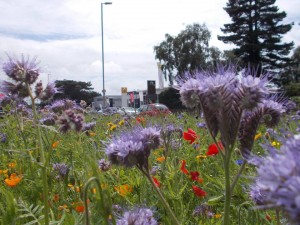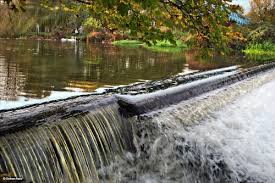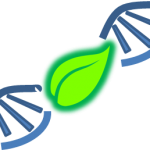
ECO-CODING is a HEIF (Higher education innovation fund) funded project that will bring the technology of DNA barcoding to BU, collaborating environmental organisations and local school children. DNA (eDNA) meta-barcoding involves the use of DNA produced by living organisms, collected from the environment and matched to DNA databases telling us what species are present. eDNA can rapidly, non-invasively and cost effectively inform and influence critical issues in ecology and forensics.
The project has four key elements:
Urban Pollinators Project: How are pollinators using urban wildflower planting strips?
The Urban Pollinators project will be in collaboration with Dr Natasha de Vere from the National Botanic Garden of Wales and Bournemouth Borough Council. The project will identify pollen species from pollinators’ bodies to uncover what plants they are using in the urban environment and in addition discover the value of urban wildflower planting. This will inform the best planting strategies for pollinators. This project will provide guidance both locally (Bournemouth Borough Council) and nationally through the HEIF+1 funded Pollinator Exchange Hub Led by Dr Liz Franklin and Dr Kathy Hodder

The river connectivity project: How are engineering structures affecting migratory fish in the river Severn catchment?
The river connectivity project is in collaboration with the Environment Agency, Natural England and the Severn Rivers Trust. Using an eDNA collected from the water and using meta-barcoding techniques the project will assess how river engineering structures in the River Severn catchment shape its biological fish communities, with a focus on migratory fish such as salmon (threatened) and eels (critically endangered). Led by Professor Rob Britton, Dr Demetra Andeou and Dr Emilie Hardouin

Develop a hub for eDNA meta-barcoding at BU
After completing the two meta-barcoding projects will qualify BU’s expertise in this field. ECO-CODING BU will discuss the potential of advertising and providing commercial eDNA meta-barcoding services as part of BU’s consultancy services BUG (Adrian Pinder), providing a unique angle to the services BUG can deliver to its customers and increasing BU’s potential for impacting ecological policy worldwide.
Inspiring local community and engaging the public.
Delivering public outreach events at BU’s festival of learning and at the National Botanic Garden of Wales in collaboration with the Faculty of Media and Communication. We will introduce our work at these outreach events using the concept of “The DNA Detective” and a series of interactive narratives, much like the Royal Society Christmas lectures, focusing on plant DNA such as, pollen being used link a burglar to a crime scene who brushed against a particular bush on his way out. will promote these events to local schools with the help of our BU Advertising students and maximising social media use to generate publicity using #DNADetective. Led by Dr Jenny Alexander and Dr Liz Franklin
Watch this space, eDNA meta-barcoding is coming to BU.
(This project is funded through HEIF – HEIF 5+1+1 – with funding running from 1 August 2016 until 31 July 2017.)
 Wanted Post Doc: Eco Coding BU
Wanted Post Doc: Eco Coding BU










 Missing Persons Indicator Project Recruitment
Missing Persons Indicator Project Recruitment Celebrating our Research: Postgraduate Research Showcase 2026
Celebrating our Research: Postgraduate Research Showcase 2026 Nursing Research REF Impact in Nepal
Nursing Research REF Impact in Nepal Fourth INRC Symposium: From Clinical Applications to Neuro-Inspired Computation
Fourth INRC Symposium: From Clinical Applications to Neuro-Inspired Computation ESRC Festival of Social Science 2025 – Reflecting back and looking ahead to 2026
ESRC Festival of Social Science 2025 – Reflecting back and looking ahead to 2026 3C Event: Research Culture, Community & Cookies – Tuesday 13 January 10-11am
3C Event: Research Culture, Community & Cookies – Tuesday 13 January 10-11am ECR Funding Open Call: Research Culture & Community Grant – Application Deadline Friday 12 December
ECR Funding Open Call: Research Culture & Community Grant – Application Deadline Friday 12 December MSCA Postdoctoral Fellowships 2025 Call
MSCA Postdoctoral Fellowships 2025 Call ERC Advanced Grant 2025 Webinar
ERC Advanced Grant 2025 Webinar Horizon Europe Work Programme 2025 Published
Horizon Europe Work Programme 2025 Published Update on UKRO services
Update on UKRO services European research project exploring use of ‘virtual twins’ to better manage metabolic associated fatty liver disease
European research project exploring use of ‘virtual twins’ to better manage metabolic associated fatty liver disease